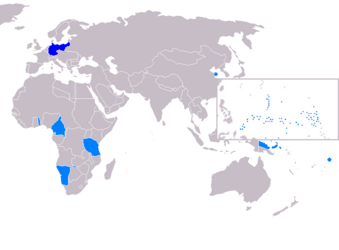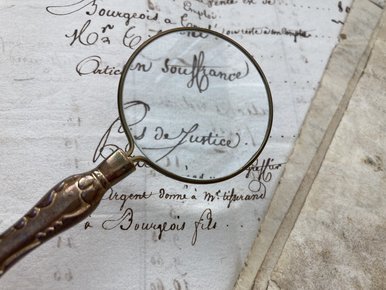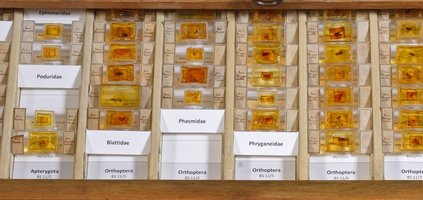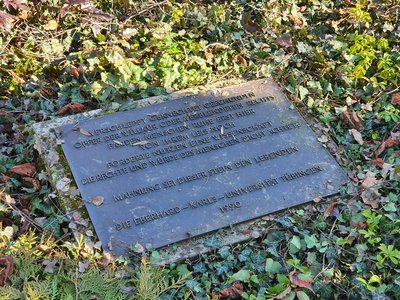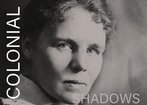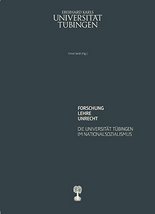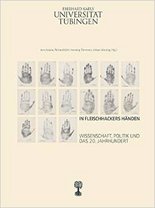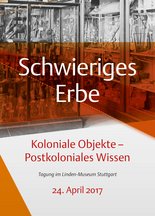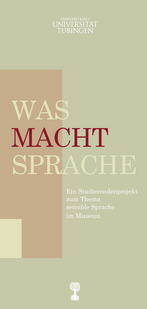Tasks and Challenges for Collections Preserving Cultural Property
For some years now, provenance research has received increasing attention, as have the terms stolen art, looted art, human remains, restitution or repatriation. At the University of Tübingen, with its approximately 70 collections, the determination of the origin of objects and human remains as well as the proof of possible contexts of injustice was also recognized as an important research desideratum. Individual aspects have already been dealt with in depth in scientific projects, publications and exhibitions. However, this topic will continue to accompany us in the future, as it not only concerns objects that already belong to our collections, but also those that will be added in the future.
Project 'Research on Human Remains in the Collections of the University of Tübingen'
Building on the work carried out in the joint project ‘Precarious Provenance’, this project aims to process and document ancestral human remains that entered the collections of the University of Tübingen from former German colonial territories and, more generally, during the colonial era.
Project "Precarious Provenance"
The joint research project "Precarious Provenance – Human Remains from Africa's Colonial Past before 1919 in Scientific Collections in Baden-Württemberg" was officially launched on September 1st 2021 and extended until August 31st 2024. The aim of the project was to investigate individuals who studied, collected and traded human remains more than 100 years ago. The reconstruction of past networks, expedition routes, and translocations are essential basic research for future projects in the field of colonial-era provenance research.
Collections from colonial contexts at the MUT
The Museum of the University of Tübingen MUT has a total of around 80 collections and 130 sub-collections with extensive holdings from all faculties. In view of the diversity of the collection holdings, the question arises as to the history of the objects, their origin, previous changes of ownership and the circumstances of acquisition. The topic of the colonial period brings into focus various collections whose objects were collected worldwide due to the respective field of research.
Central Point of Contact for Provenance Research at MUT
The MUT has developed into a central point of contact for the more than 70 collections at the University of Tübingen when dealing with sensitive objects as well as restitution and repatriation issues. In August 2020, Dr Fabienne Huguenin was appointed to the position of Provenance and Collection Researcher at the Museum of the University of Tübingen MUT. She supported projects on cultural assets confiscated due to Nazi persecution and in the context of the "difficult legacy" of the colonial era. She successfully acquired third-party funding from the German Lost Art Foundation for the joint project "Precarious Provenance". Since January 1, 2024, she has been project manager at the Directorate General of the Bavarian State Archives in the project "Transformation of Wiedergutmachung". Files from the Landesentschädigungsamt (State Office for Compensation), central authority case files as well as files and card indexes from the Landesamt für Vermögensverwaltung und Wiedergutmachung (State Office for Property Administration and Restitution) are being digitized and are to be made accessible online with their indexing information via the Online collection "Wiedergutmachung for National Socialist Injustice", insofar as this is permitted under the applicable legal norms. Since August 2024, Dr. Annika Vosseler is responsible for provenance research at the MUT.
The colonial era and its "difficult legacy" have been the subject of increased attention, particularly since the report "Restitution of African Cultural Heritage. Toward a New Relational Ethics" by Bénédicte Savoy and Felwine Sarr in 2018. Among other things, the focus is on fundamental research, such as network research, to reconstruct past connections between collectors, researchers, institutions, and other actors. However, the exchange with other institutions, such as the Baden-Württemberg collections at museums and universities, as well as with nationally and internationally active working groups, projects and other associations in the field of provenance research is also indispensable. Furthermore, the establishment of contacts to societies of origin is pursued in order to consider the view and position of the global south in the respective projects.
As the past has shown more than clearly, provenance research is a long-term task, partly because of the difficult, lengthy research required due to incomplete records and the sheer mass of objects whose history of origin has not yet been clarified. As every object that is newly added to a collection must be investigated in terms of its origin, we will have to deal with provenance history in the future as well.
Provenance Research - What is that actually?
Fair and Just Solutions
If a context of injustice is proven or assumed, then the question of restitution or, in the case of human remains, repatriation arises quite soon. In these cases, the entitled heirs or the societies of origin must be identified. Even if statutes of limitations can already be invoked, it remains our moral duty, demanded by society as well as politics, to deal with the issue and to strive for such restitution or repatriation. This has been the general consensus at least since the Washington Principles. On December 3, 1998, following the Conference on Holocaust-Era Assets, 44 states signed this legally non-binding agreement. The aim of the voluntary commitment is to identify looted art, to locate pre-war owners or heirs and to arrive at "just and fair solutions". If the initial focus was on the Nazi period, these objectives now apply to all contexts of injustice, to the colonial period as well as to the former Soviet Occupation Zone (SBZ) or the GDR.
Challenges of Provenance Research
The problem is: the further back in time the event of unjustly seizure occurred, the smaller the amount of preserved data usually is. Inventory books have been lost over time, documents have been desposed during moves, letters, notes and other records can no longer be found, sometimes records have been given to an archive. It should also be noted that the level of knowledge about the history of origin of objects at university collections is often lower compared to scientific collections at museums. This may be due to the fact that university collections have received less attention in recent decades, and that their importance for research, teaching, outreach, and as the cultural heritage of our educational institutions has only been acknowledged in the last ten years or so. Former collection custodians, researchers or collectors can often no longer be interviewed, and so other ways must be found to obtain information about the origin of the objects. Detours are often necessary, which is why contacts with other collections and provenance researchers are essential.
Valuable Insights
For university collections, provenance research provides further, in-depth insights into their own institution and knowledge about the actors involved, which had often been forgotten. The history of the institution and the collection is illuminated and thus the understanding of the individual research directions is considerably expanded. The work in today's networks – i.e. together with other scientific collections, museums or institutions as well as with colleagues – enables the reconstruction of earlier networks, which are not only highly relevant in the context of provenance research, but also for epistemology.
Provenance Research at the University of Tübingen
The relevance of provenance research and the historical reappraisal of past injustices were recognised at the University of Tübingen. As early as the 1970s and 1980s, research on this topic was conducted and published (e.g. Wilfried Setzler/Uwe Dietrich Adam: Hochschule und Nationalsozialismus: die Universität Tübingen im Dritten Reich, Tübingen 1977; Benigna Schönhagen: Das Gräberfeld X: eine Dokumentation über NS-Opfer auf dem Tübinger Stadtfriedhof, Tübingen 1987). An exhibition of the Tübingen University Archives in 1983 dealt with the beginnings of National Socialism at the University of Tübingen between 1926 and 1934 (see accompanying booklet). In 2001, the University Library returned the surviving part of the book collection of Caesar Hirsch (1885–1940), which had been confiscated by the Gestapo in 1933, to the rightful heirs in the USA. A bibliography concerning the University of Tübingen during the National Socialist era is also available online (see here).
Theses in the field of provenance research
Within the Master's programme MuSa and the Art History programme, various theses have been written on the subject of provenance research. As of winter semester 2024/2025 these are:
If you are interested in these theses, please contact Dr. des. Annika Vosseler.
- Ning Yuan: “Von China nach Württemberg. Eine Provenienzstudie zu Akteuren der Kolonialgeschichte im deutschen Südwesten” (From China to Württemberg. Provenance study on stakeholders of colonial history in the German Southwest). Master's thesis, Eberhard Karls University Tübingen, WS 2024/2025.
- Amy Kraiß: Kunstraub unter dem Roten Stern. Folgen der (post-)sowjetischen Ideologie für den deutsch-russischen Restitutionsdialog (Art theft under the Red Star. The consequences of (post-)Soviet ideology for the German-Russian restitution dialogue). Master's thesis, Eberhard Karls University Tübingen, SoSe 2024.
- Sarah Kling: “Der Weg der geraubten Bücher – Provenienzforschung zu NS-Raubgut an der Universitätsbibliothek Tübingen” (The path of looted books – Provenance research on Nazi loot at the University Library of Tübingen). Master's thesis, Eberhard Karls University Tübingen, WS 2023/2024.
- Tatjana Aischa Dörrer: “Der ‘blaue Fritz’ – König Wilhelm II. als Förderer kolonialer Sammelwut in Württemberg” (The ‘Blue Fritz’ – King Wilhelm II as promoter of the colonial collecting mania in Württemberg). Master's thesis, Eberhard Karls University Tübingen, WS 2023/2024.
- Antonia-Luise Arntzen: "Der Fall ‘Aktion Licht’ – Die Geheimoperation der Stasi und ihre Bedeutung für die Provenienzforschung" (The case 'Aktion Licht' - the secret operation of the Stasi and its significance for provenance research). Bachelor's thesis, Eberhard Karls University Tübingen, WS 2023/2024.
- Katja Schurr: “Souvenirs aus den Kolonien – Provenienzforschung zu den afrikanischen Masken der Sammlung Domnick” (Souvenirs from the Colonies – Provenance Research on African Masks in the Domnick Collection). Master's thesis, Eberhard Karls University Tübingen, WS 2022/2023. (Her results were published in the journal Schwäbische Heimat (2023|3) unter the title of "Koloniale Spuren in der Gegenwart. Provenienzforschung an den afrikanischen Masken der Sammlung Domnick“ (Colonial traces in the present. Provenance research on the African masks in the Domnick collection))
On January 22nd, 2025, the online exhibition “Colonial Shadows. The Palauan Legacy of Elisabeth Krämer-Bannow in Tübingen" was opened. It is dedicated to the ethnologcal and artistic work of Elisabeth Krämer Bannow (1874–1945). She was the only female member of the Hamburg South Sea expedition from 1908–1910, travelling to Palau and leaving behind a unique documentation of the lives of Palauan women. The content and design were developed by students of ethnology, history, art history and the Master's programme “Museum & Collections”.
In 2002, the research group “Universität Tübingen im Nationalsozialismus” was founded. In this context, numerous publications emerged, which were produced in cooperation with several university institutions. The comprehensive volume “Die Universität im Nationalsozialismus”. was published in 2010. The Tübingen University Archives (UAT) provides extensive source material for research on the Nazi period as well as the colonial period or other possible contexts of injustice. They are not only in charge of the safekeeping of written documents that were handed over to the archive by the collections, but also of the corresponding records of the central administration and the faculties concerning the collections and institutes. These, as well as individual bequests, may serve as valuable addition to the history of the collection. The Tübingen University Archives team supports all enquirers with professional advice.
In 2015, and thus 70 years after the end of the war, a Studium Generale series on the topic was initiated. In addition, the museum of the University of Tübingen MUT offered two exhibitions: "Forschung, Lehre, Unrecht" and "In Fleischhackers Händen. Wissenschaft, Politik und das 20. Jahrhundert". While the former exhibition dealt with university teaching in Tübingen in general, the latter focused on the racial studies habilitation thesis of the Tübingen anthropologist Hans Fleischhacker (1912–1992), which was accepted by the university in 1943. Provenance research is also regularly thematized in the seminars offered in the “Master Profile MuSa” for the education of young academics: In 2020/21 with the seminar "Lehrforschungsprojekt: NS-Volksgemeinschaft. Nationalsozialistische Gewaltverbrechen in der Provinz im Spiegel der Tübinger Anatomie" (Benigna Schönhagen), in 2019/20 with "Kolonialzeitliche Sammlungen als schwieriges Erbe" ( Thomas Thiemeyer) and in 2017/18 with "Die Biographie der Objekte" (Anette Michels).
From 2016 to 2018, the project “Schwieriges Erbe: Zum Umgang mit kolonialzeitlichen Objekten in ethnologischen Museen” (“Discomforting Heritage: Practices and discourses of dealing with objects from colonial contexts in anthropological museums”) was carried out jointly by researchers from the University of Tübingen and the Linden-Museum. The project initiators, Inés de Castro, Gabriele Alex and Thomas Thiemeyer, and their research teams looked at the histories of origin of individual collection objects from the former German colonies in Southwest Africa. The pilot study faced the criticism of ethnological museums and began an intensive reappraisal of colonial history. The clarification of histories of origin and the biography of the collections were one part of the project, the other faced the challenge of a museum as a repository and mediator of knowledge in the context of social diversity. In addition, Prof. Dr. Johannes Großmann from the Seminar for Contemporary History is dealing with the history of science in the colonial era.
A digital workshop was held at the University of Tübingen from 19 to 21 May 2021 under the title „Wissenschaft und Universität zwischen kolonialer Vergangenheit, postkolonialer Gegenwart und dekolonialer Zukunft“ ("Science and University between Colonial Past, Postcolonial Present and Decolonial Future"). Some of the contributions to the workshop were published in the journal "Geschichte in Wissenschaft und Unterricht" with the title "Koloniales Erbe(n)".
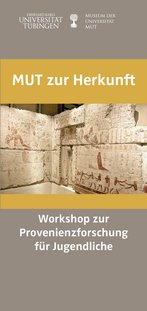
In the Master Profile "museum & collections" ("Museum & Sammlungen" MuSa), the Museum of the University of Tübingen MUT offered a practical seminar spanning over the winter semester 2020/2021 and in the summer semester 2021 while focusing on the topic "Mediation Formats with MUT | Museum Didactics at the Museum of Ancient Cultures". A group of students developed a provenance workshop for youth. It takes into accout the curricula for grades 7 to 12 of the state of Baden-Württemberg with the topics of imperialism, eurocentrism, colonialism and postcolonial effects. Using individual display objects from the permanent exhibition at the Museum Alte Kulturen (Museum Ancient Cultures), this workshop uses an interactive scavenger hunt to explain various aspects of provenance research. The students are guided by the serious game app Actionbound. They learn about various provenance issues such as dubious donations or excavations, looted art, and obscure acquisition histories. The young people are confronted with the question: What does this have to do with me? Finally, the results of the search game are compiled in the workshop room and presented on pinboards. The workshop was conceived by the students Franziska Bürkle, Lilly Kurz, Katja Schurr, Sümeyye Tarhan and Antonia-Luise Arntzen.
THE POWER OF LANGUAGE
A student project on sensitive language in the museum
As part of the practical seminar 'Sensitive Language in Provenance Research and in Museums' (Summer Semester 2023), students from various humanities disciplines went in search of potentially problematic terms in the permanent exhibition of the University of Tübingen's museum (Museum Ancient Cultures in Hohentübingen Castle). In this case, the term 'problematic' refers not only to terms that are overtly discriminatory (racist, antisemitic, ableist, sexist or queer-hostile), but also to terms that obscure or gloss over the circumstances and events surrounding the acquisition of the objects.
The seminar has resulted in a brochure in which the students attempt to give the reader an insight into the terms they find problematic and/or discriminatory and their historical contexts. They would like this first attempt to be a step towards 'sensitive language' in the Museum of the University of Tübingen and to encourage readers to question and reflect on certain terms in everyday language.
Please note: This brochure deals with terms that may be politically problematic or, for some people, disturbing, emotionally upsetting or stressful. It does not claim to be complete or accurate. We reserve the right to make changes in the future.
A joint project of the MUT together with the Osteological Collection/Senckenberg Centre for Human Evolution and Palaeoenvironment of the University of Tübingen, the Linden-Museum Stuttgart and the State Museums of Natural History in Karlsruhe and Stuttgart on the sensitive topic of human remains from the colonial period was submitted to the German Lost Art Foundation. The project "Precarious Provenance" will run for three years, from 1 September 2021 to 31 August 2024.
Other institutions in the immediate vicinity are also engaged in provenance research, such as the "Tübinger Stadtmuseum" (City Museum). The online pages of the city of Tübingen offer tours on various topics, such as the "History Path to National Socialism" which also provides information on the University of Tübingen during that era.



